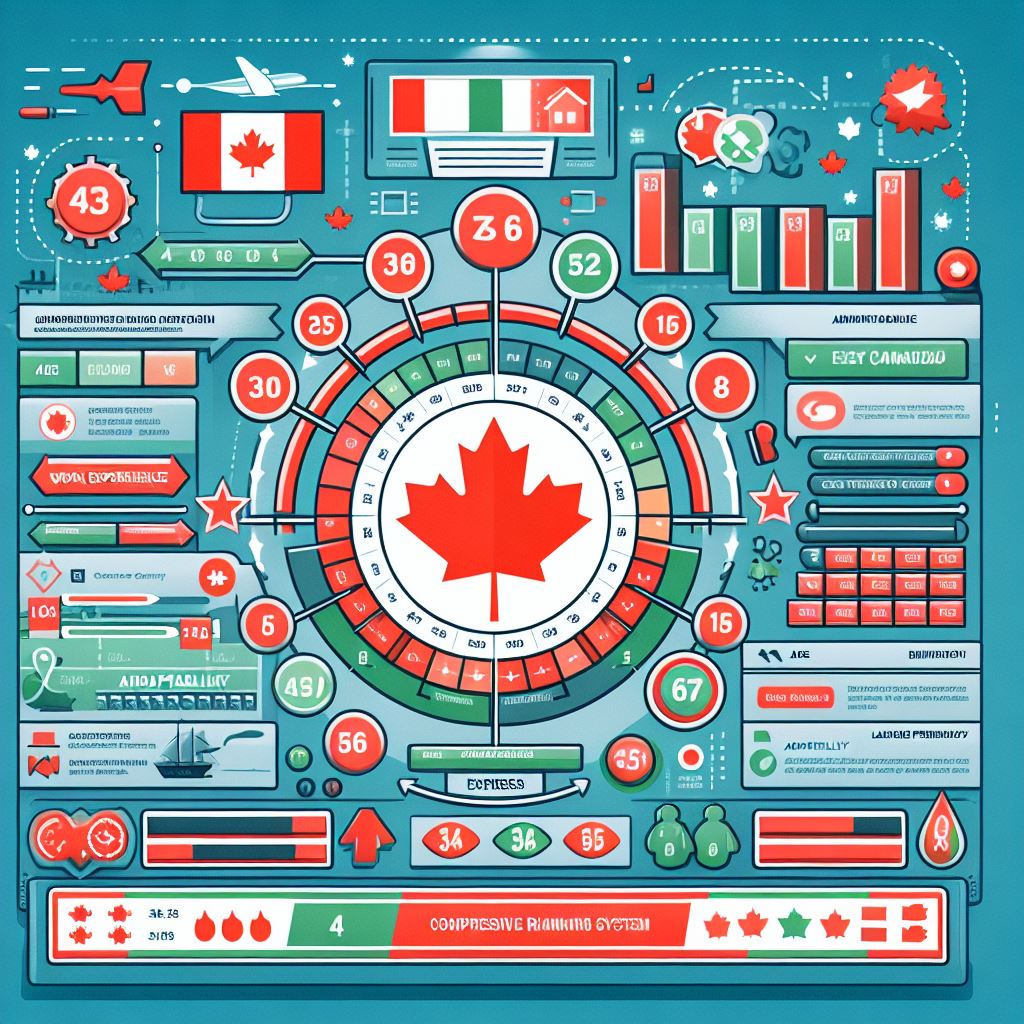Understanding the Comprehensive Ranking System (CRS)
The Comprehensive Ranking System (CRS) plays a crucial role in the Canadian immigration process, specifically within the Express Entry system. This points-based system assesses skilled workers’ qualifications and ranks them based on various factors. In this article, we will delve into the details of the CRS and discuss how it influences an individual’s chances of obtaining permanent residency in Canada.
What is the Comprehensive Ranking System (CRS)?
The Comprehensive Ranking System (CRS) is a system used by the Canadian government to evaluate and rank skilled workers who are seeking Canadian permanent residence. It takes into account several factors to assess an individual’s eligibility and potential contribution to the Canadian job market. The CRS awards a maximum of 1,200 points across four main sections: Core/Human Capital Factors, Spouse/Common Law Partner Factors, Skill Transferability Factors, and Additional Points.
Factors assessed by the CRS
The CRS considers a wide range of factors when assessing an applicant’s eligibility for Canadian permanent residence. Some of the key factors include age, education, work experience, language proficiency, and skills. These factors provide a comprehensive overview of an applicant’s potential to integrate into the Canadian society and contribute to the country’s economy.
Importance of the CRS in Express Entry
The CRS holds significant importance within the Express Entry system, which is the primary pathway for skilled workers to immigrate to Canada. Candidates who are eligible for Express Entry are placed into a pool where they are ranked based on their CRS scores. The highest-ranked applicants are then invited to apply for permanent residence through regular draws conducted by the Canadian government.
How Points are Awarded in the Comprehensive Ranking System
Understanding how the points are allocated in the Comprehensive Ranking System (CRS) is essential for individuals looking to improve their CRS scores and enhance their chances of being selected for permanent residency in Canada. In this section, we will explore the breakdown of points allocation, strategies to increase CRS scores, and the impact of provincial nomination and job offers on the CRS score.
Breakdown of points allocation
The points allocation in the CRS is based on various factors, each contributing to the overall score. Factors such as age, education, language proficiency, Canadian work experience, spouse/common-law partner factors, and skill transferability impact an applicant’s CRS score.
For example, higher language proficiency in English or French can result in additional points, as can having a sibling in Canada or obtaining a provincial nomination.
Strategies to increase CRS score
To improve their CRS score, candidates can adopt several strategies. One effective approach is to enhance their language proficiency by taking language tests and improving their skills through language training programs. Another strategy is to pursue higher education in Canada, which can increase points in the education factor. Gaining Canadian work experience, especially in a skilled occupation, can also enhance an applicant’s CRS score.
Impact of provincial nomination and job offers on CRS score
A provincial nomination and a valid job offer can substantially boost an applicant’s CRS score. A provincial nomination automatically awards 600 points, greatly increasing the chances of receiving an invitation to apply for permanent residence.
Similarly, having a job offer in a managerial field or any other job offer adds significant points to the CRS score. Candidates should actively explore opportunities for provincial nominations and job offers to enhance their CRS scores.
Maximizing Chances for Permanent Residence
As an aspiring immigrant to Canada, maximizing your chances of obtaining permanent residence should be a primary goal. In this section, we will discuss strategies for assessing individual qualifications, utilizing resources for improving CRS scores, and the importance of continuous efforts in enhancing CRS scores.
Assessing individual qualifications
Applicants should carefully evaluate their qualifications and determine areas where improvements can be made. Assessing factors such as age, education, work experience, and language proficiency is crucial in understanding where additional efforts may be required to enhance the CRS score. Seeking professional guidance from immigration lawyers specializing in the CRS can provide valuable insights and direction.
Utilizing resources for improving CRS score
Various resources are available to individuals looking to improve their CRS scores. Online evaluation tools, such as CanadaVisa’s free CRS calculator, can help assess eligibility and estimate CRS scores.
Additionally, resources that provide guidance on Express Entry requirements, recent CRS requirements, and creating an Express Entry profile offer valuable information for candidates aiming to enhance their CRS scores.
Importance of continuous effort in enhancing CRS score
It is important to recognize that the CRS cut-off scores are unpredictable, and competition among Express Entry candidates is highly competitive.
Consequently, candidates must actively work towards improving their CRS scores while in the Express Entry pool. This can include language training, obtaining higher education, gaining Canadian work experience, and exploring opportunities for provincial nominations and job offers. Continuous effort is key to maximizing chances of receiving an Invitation to Apply (ITA) for permanent residence.
Conclusion
The Comprehensive Ranking System (CRS) is a critical component of the Express Entry system, determining the eligibility and ranking of skilled workers seeking Canadian permanent residence. Understanding how the CRS works and strategically working to improve one’s CRS score can significantly enhance an individual’s chances of obtaining permanent residency in Canada. By assessing individual qualifications, utilizing available resources, and continuously striving to strengthen one’s CRS score, candidates can maximize their opportunities for a successful immigration journey.
FAQS
What is the Comprehensive Ranking System (CRS)?
The Comprehensive Ranking System (CRS) is a points-based system used in the Canadian Express Entry program to assess and rank skilled workers based on various factors.
How does the CRS work?
The CRS assigns points to applicants based on factors such as age, education, work experience, language proficiency, spouse factors, skill transferability, and additional points for factors like a provincial nomination or job offer.
How can I increase my CRS score?
You can increase your CRS score by improving your language proficiency, obtaining higher education, gaining Canadian work experience, securing a provincial nomination, or getting a valid job offer.
Does having a provincial nomination increase my chances of receiving an invitation?
Yes, a provincial nomination can significantly increase your CRS score and greatly enhance your chances of receiving an Invitation to Apply for permanent residence.
Are there any resources to help me evaluate my CRS score?
Yes, there are online evaluation tools like CanadaVisa’s free CRS calculator that can help you assess your eligibility and estimate your CRS score.
Is work experience in Canada necessary to improve my CRS score?
While Canadian work experience can add points to your CRS score, it is not mandatory.However, having Canadian work experience can positively impact your CRS score and increase your chances of receiving an invitation.
How often are Express Entry draws conducted?
Express Entry draws are usually held biweekly. The candidates with the highest CRS scores are invited to apply for permanent residence.
Can I reapply for Express Entry if my CRS score is low?
Yes, you can re-enter the Express Entry pool if your CRS score is low.
However, it is important to actively work on improving your CRS score to enhance your chances of receiving an Invitation to Apply.
Do I need a job offer to be eligible for the Express Entry system?
No, a job offer is not mandatory for Express Entry eligibility.
Receiving an Invitation to Apply can be greatly improved by having a valid job offer, resulting in a higher CRS score.
Can I include my spouse’s credentials in the CRS calculation?
Yes, you can include your spouse’s credentials, such as language proficiency and education, in the CRS calculation. Their qualifications can contribute additional points to your CRS score.



